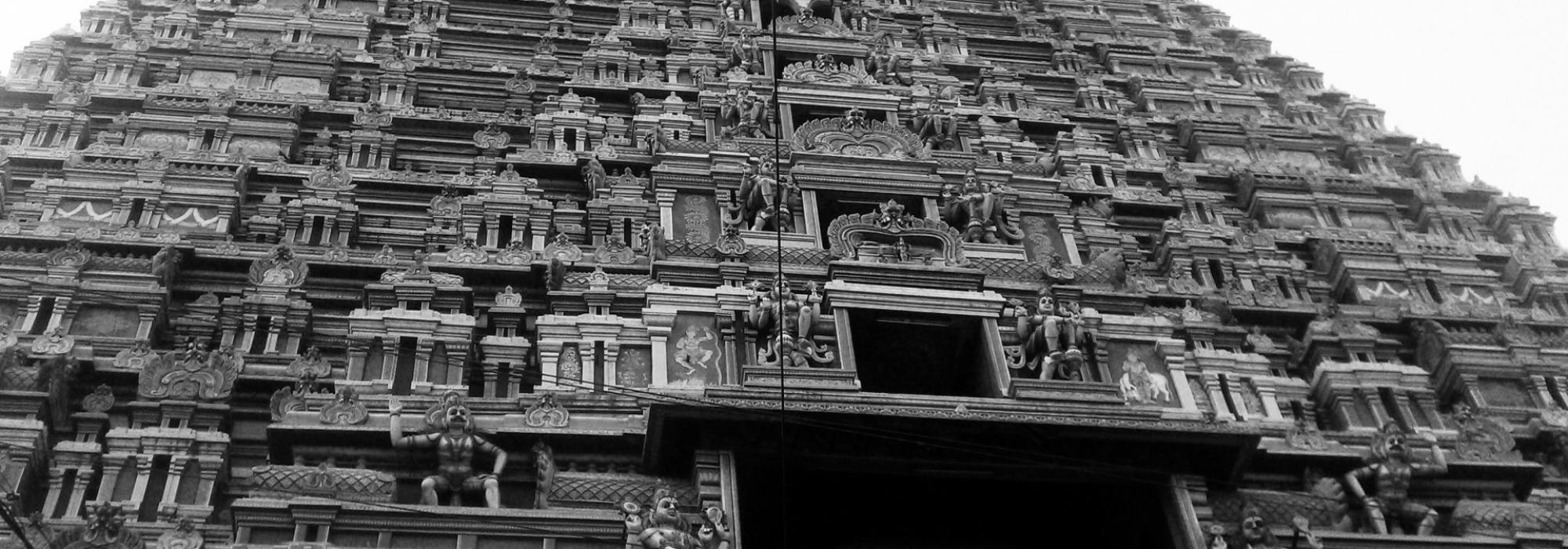There is a beautiful poem ascribed to Vedānta-deśika (born Veṅkaṭanātha) that deals with the topic of vairāgya (detachment from worldly indulgences).
क्षोणी-कोण-शतांश-पालन-कला-दुर्वार-गर्वानल-
क्षुभ्यत्-क्षुद्र-नरेन्द्र-चाटु-रचना-धन्यान्-न मन्यामहे।
देवं सेवितुम्-एव निश्चिनुमहे योऽसौ दयालुः पुरा
धाना-मुष्टिमुचे कुचेल-मुनये दत्ते स्म वित्तेशताम्॥ 1
(Meter: Śārdūlavikrīḍitam)
We hardly bother with those
who feel blessed composing verses
praising an insignificant king,
burning with pride,
who rules over a minuscule portion
of a corner of this great earth!
We have decided to worship
only that merciful one
who in the past enriched Kuchela
with the wealth of Kubera
in exchange for a fistful of rice
सिलं किम्-अनलं भवेद्-अनलम्-औदरं बाधितुं
पयः प्रसृति-पूरकं किमु न धारकं सारसम्।
अयत्न-मलमल्लकं पथि पटच्चरं कच्चरं
भजन्ति विबुधा मुधा ह्य्-अहह कुक्षितः कुक्षितः॥ 2
(Meter: Pṛthvī)
To satiate the fire of the stomach, won’t
grains spilled in the fields suffice?
To quench one’s thirst, won’t
water in the palm of one’s hand suffice?
Won’t a dirty cloth found by the wayside without effort
suffice for a loincloth?
Alas! Scholars are, in vain, singing praises –
all for the sake of their stomachs!
ज्वलतु जलधि-क्रोड-क्रीडत्-कृपीडभव-प्रभा-
प्रतिभट-पटु-ज्वाला-मालाकुलो जठरानलः।
तृणम्-अपि वयं सायं सम्फुल्ल-मल्लिमतल्लिका
परिमलमुचा वाचा याचामहे न महीश्वरान्॥ 3
(Meter: Hariṇī)
Let the fire of the stomach with a row of flames burn
like the great fire that burns in the ocean’s bosom
Yet we shall not beg the king
even for a blade of grass
with our words that are fragrant
like the fully-blossomed jasmine at dusk
दुरीश्वर-द्वार-बहिर्-वितर्दिका-
दुरासिकायै रचितोऽयम्-अञ्जलिः।
यद्-अञ्जनाभं निरपायम्-अस्ति मे
धनञ्जय-स्यन्दन-भूषणं धनम्॥ 4
(Meter: Vaṃśasthavilam)
Why should I wait at the door
of a lowly king with folded hands
when I have the indomitable wealth
that is lustrous as kohl
and adorns the chariot of Arjuna!
शरीर-पतनावधि प्रभु-निषेवणापादनाद्-
अब्-इन्धन-धनञ्जय-प्रशमदं धनं दन्धनम्।
धनञ्जय-विवर्धनं धनम्-उदूढ-गोवर्धनं
सुसाधनम्-अबाधनं सुमनसां समाराधनम्॥ 5
(Meter: Pṛthvī)
Wealth produced from praising kings
satisfies the stomach-fire with water,
lasting only until the body falls; it’s useless
True wealth is that which uplifted Arjuna
and raised the Govardhana mountain
It’s the wealth that obstructs not good work
and that which brings joy to the noble
नास्ति पित्रार्जितं किञ्चित्
न मया किञ्चिद्-आर्जितम्।
अस्ति मे हस्ति-शैलाग्रे
वस्तु पैतामहं धनम्॥
(Meter: Anuṣṭup Śloka)
I have not inherited any wealth
nor have I earned anything
The wealth that Brahmā
has given me is (devotion to)
the lord of Hasti-śaila (Lord Varadaraja of Kanchipuram)
The beauty of these verses is not merely in their meaning but also in their form. The brilliant word-play and the alliterations that Deśika uses with aplomb are totally lost in translation. Even if one doesn't know the language, one can derive great pleasure by reading aloud the verses for their lilting melody resulting from its intricate syllabic structure.
There is a historically inaccurate account that Deśika wrote these verses in response to Vidyāraṇya's invitation. One can have a look at Śatāvadhāni Dr. R Ganesh’s biography of the great preceptor of Vijayanagara, Vibhūtipuruṣa Vidyāraṇya for more details.
My heartfelt thanks to Shashi Kiran B N for copyediting the Sanskrit verses, identifying the poetic meters, reviewing my translation, and giving me several valuable suggestions.
References
Vairagya Panchakam
Śatāvadhāni Dr. R Ganesh’s Kavitegondu Kathe (Bangalore: Abhijñāna, 2012)















































